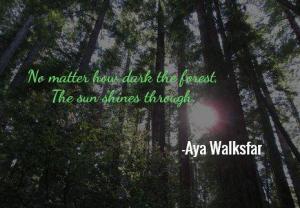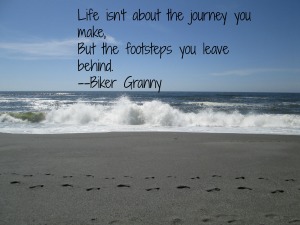http://www.amazon.com/Hard-Road-Home-Aya-Walksfar-ebook/dp/B00TLCRUFQ

The Story Behind Hard Road Home
Many times those charged with keeping troubled kids safe become their worst nightmare. Already feeling as if they are broken, the child believes s/he is at fault for the adult’s abusive behavior. Abuse by the foster parent, or other authority figure, confirms this belief: it must be their fault since more than one adult abused them. They must’ve “asked for it”; or, somehow “provoked” the assault.
Such beliefs coupled with low self-esteem program the child to act in ways that mark her/him as a victim. Perpetually trying to please, and always failing. The cycle of abuse repeats itself, over and over, with different abusers.
After aging out of the social services system,this learned hopelessness continues to haunt the young person. Often s/he drops out of school, and can’t find a job with a living wage. In economic desperation and emotional neediness, s/he moves in with an abuser. Her/his self-esteem and economic position works to keep them locked into the unhealthy relationship.
Either introduced to alcohol and drugs by the abuser as a way to further control over the victim and to undermine self-esteem/self-confidence, or discovering the awesome numbing effects on their own, the victim becomes addicted. Addictions lead to deeper feelings of inadequacy and further confirmation of worthlessness.
Having never learned to relate to others in a healthy way, s/he cannot accept that anyone would want to befriend her/him if s/he wasn’t sexually pleasing and easily available. Relationships with adults during childhood have confirmed this reality in the victim’s mind.
Many young people die trapped in this cycle of never-ending abuse.
Hard Road Home goes beyond the tragedy of such children. When people read Casanita Redner’s story,Hard Road Home,five things will remain with them:
1. This story is based upon facts, though I have fictionalized the account to be able to concentrate on clarifying the message. Like Cas, however, there are young people who have found the strength to fight free of childhood sexual abuse. Remember: 
2. Adults, whether central or peripheral to the child’s life, can in fact aid the child in laying a foundation that will allow her/him to escape this vicious cycle of abuse. In Hard Road Home, Cas receives these building blocks for a stable foundation from her grandfather, her grandmother, and other healthy adults she meets along the way.
3. Every adult has the responsibility to become aware of victimization of children, and to work–in whatever capacity that they can–to end it. Whether you are an educator, an author, a doctor, a counselor, a social worker, a foster parent, or a neighborhood adult you can make an impact.

4. Child victims are NOT responsible for the crimes against them, regardless of how they dressed, walked, talked, or acted. Children are worthy of true friendships and deserve healthy relationships.
5. If you have been a child victim, I am here to tell you: you can break free. You have the right to build a good life for yourself. You are lovable. You deserve people in your life who value you. Believe in yourself! You are worth it!

Are you one of the adults who help shine a light for young people during a dark night? Are you a survivor of childhood abuse? Please leave a comment.
You can always reach me at ayawalksfar@gmail.com
Tag Archives: foster parents
4 Lessons From A Child
All too frequently those who are charged with keeping young girls, especially troubled young girls, safe, become the predators that damage them the most.
A classic example is the foster father who rapes the young girl placed in his home because her home is not a safe place to live. Instead of finding acceptance, safety and an adult to help her understand and overcome her past experiences, she is faced with another rapist/child molester.
The young girl is already feeling as if she is somehow broken; that it is somehow her fault that her father/mother beat her or sexually molested her. Now, another adult is repeating the same crimes against her. This serves to confirm that whatever bad thing has happened, and is happening, to her is her own fault. She brought it upon herself because she acted provocatively; dressed provocatively; said the wrong thing; led him on; asked for it; and any number of incorrect beliefs.
If the girl is “groomed” by the predator–this is often done by pretending to love the victim, giving small gifts, seduction rather than use of force–she may come to believe that no one else will ever understand her the way “he does” and when she is no longer of interest to the predator, she will become depressed and feel heart broken. Some of these young women commit suicide. At the very least, she will never be able to truly realize that she was a victim, rather than a participant, and her chance to heal will suffer.
Unfortunately, in either case–groomed to be a sexual object or raped forcibly–she will then subconsciously act in ways that mark her as a victim. And the cycle repeats itself, over and over.
Even after she ages out of the social services system, these beliefs continue to impact her for the rest of her life. She becomes unable to value herself and so she often fails or drops out of school. Unable to support herself becomes one more pressure that forces her into unhealthy relationships and makes it nearly impossible for her to leave them; she frequently becomes addicted to alcohol and drugs in order to numb her feelings of inadequacy and in the end confirms her own worthlessness; she will sometimes enter the sex trades because she doesn’t believe she has any other value and she doesn’t believe she is intelligent enough for any other type of work. She is the woman who inevitably seeks out domestically violent partners who further degrade her.
She lives what she has been taught over and over by authority figures: her value lies in sexually pleasing and being sexually available. If a person is not sexually interested in her, she believes they would not want to be around her; to be her friend. Her internal motto is: if he/she doesn’t want me sexually, why would he/she want me at all? She is unable to form healthy friendships with either gender as she doesn’t have the self-esteem necessary. Without those healthy relationships, she has no place to learn that she has value that is unrelated to her sexuality.
Many girls die trapped in this cycle of never-ending abuse.
In Hard Road Home I explore the dynamics that place young girls in such an untenable life. If I stopped at that point, it would be a heartbreaking story, although well worth the time to read and understand it. But I go farther and explore how a young girl might find the strength to refuse her victimhood and how that might play out in her future.
It is my hope that when people read Casanita Redner’s story four things will remain with my readers:
- This story is based upon facts, though I have fictionalized the account to be able to concentrate on clarifying the message. There are young women who have found the strength to fight free of childhood sexual abuse.
- There are ways that adults can help lay a foundation that will allow such a young girl to fight free of her victimhood. In fact, Cas is blessed by these building blocks given to her by her grandfather, her grandmother and other healthy adults that appear in her life.
- It is each adult’s responsibility to become aware of this type of victimization and to work in whatever capacity that they can to see that it ends. As an author, writing is the tool I use to assume my part of this responsibility.
- If you have been a child victim, know that you are not responsible for the crimes against you; you are worthy of true friendships and healthy relationships; you can break free and build a good life for yourself. Believe in yourself! You are worth it!
To read about recent cases:
http://www.seattlepi.com/local/article/Lawsuit-State-failed-sexually-abused-girl-at-3-5393881.php
“…..The two foster fathers caught abusing the girl received suspended prison sentences – at least initially – after Pierce County judges opted to use a sentencing scheme available to sex offenders who abuse children they’re close to.
Had she not been living with the men, both would have faced years behind bars; instead, they were able to avoid prison time entirely through Washington’s Special Sex Offender Sentencing Alternative law.
http://www.courts.wa.gov/content/manuals/SexualOffense/chapter8.pdf
……She was first placed with Jose Miranda and his wife, Juanita. Jose Miranda would later become infamous for the sexual abuse he perpetrated on children during the nine years he was a foster father.The Mirandas were licensed as foster parents even though Juanita Miranda’s own children had been taken from her while she was living in California. Having been convicted of crimes in Washington, Oregon and California, Juanita Miranda also tested positive for opiates while she was pregnant six years before the girl was placed with the couple.
According to the lawsuit, Juanita Miranda was under Department of Corrections supervision for a felony theft when she and her husband were approved as foster parents. Both lied to DSHS on questionnaires meant to prevent convicts, addicts and people too sick to care for children from becoming foster parents….” All material bracketed by these quote marks was taken directly from the Seattle PI article, link above.
Another case, this one in Oregon:
http://www.oregonlive.com/portland/index.ssf/2014/12/portland_jury_awards_biggest_s.html
